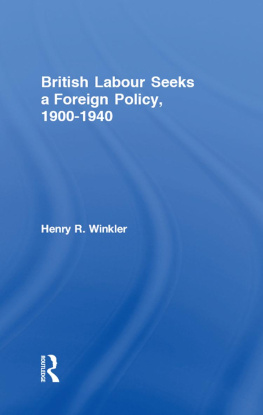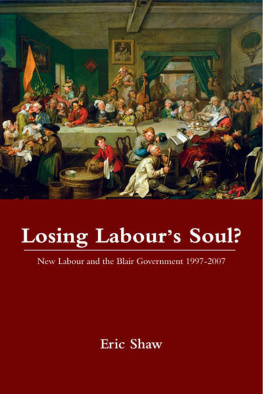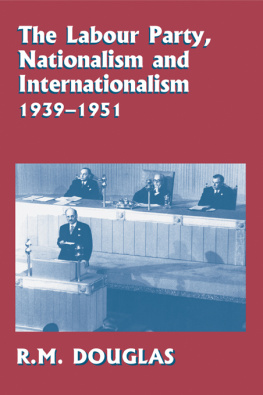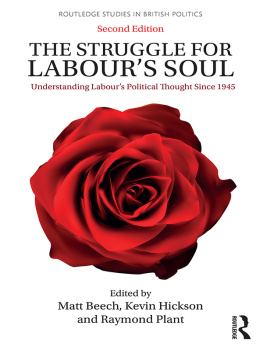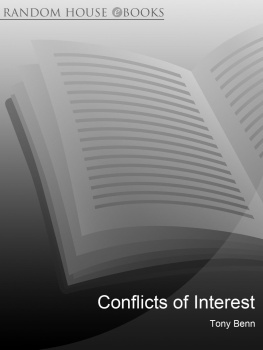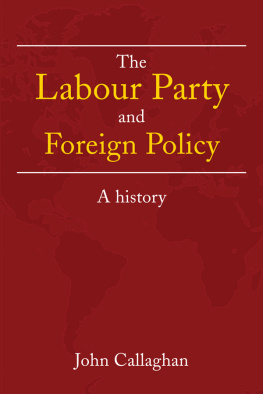The Labour Party and the world
VOLUME 1
For Ceridwen
The Labour Party and the world
VOLUME 1
The evolution of Labours foreign policy, 190051
Rhiannon Vickers
Copyright Rhiannon Vickers 2003
The right of Rhiannon Vickers to be identified as the author of this work has been asserted by her in accordance with the Copyright, Designs and Patents Act 1988.
Published by
Manchester University Press
Oxford Road, Manchester M13 9NR, UK
and Room 400, 175 Fifth Avenue, New York, NY 10010, USA
www.manchesteruniversitypress.co.uk
Distributed exclusively in the USA by
Palgrave, 175 Fifth Avenue, New York,
NY 10010, USA
Distributed exclusively in Canada by
UBC Press, University of British Columbia, 2029
West Mall Vancouver, BC, Canada V6T 1Z2
British Library Cataloguing-in-Publication Data
A catalogue record for this book is available from the British Library
Library of Congress Cataloging-in-Publication Data applied for
ISBN 978 0 7190 6744 0
First published 2003
11 10 09 08 07 06 05 04 03 10 9 8 7 6 5 4 3 2 1
Typeset by Helen Skelton, Brighton, UK
Printed in Great Britain
by Biddles Ltd, Guildford and Kings Lynn
Contents
List of tables
Acknowledgements
I would like to thank the following institutions for permission to quote from the documents of which they hold the copyright: the British Library of Political and Economic Science, London School of Economics, for the use of the following papers (Hugh Dalton, Arthur Lansbury, E. D. Morel); Churchill College, Cambridge (Ernest Bevin papers); the Modern Records Centre, University of Warwick (TUC, Keep Left and miscellaneous papers); the National Labour History Archive, Manchester (Labour Party papers); the Public Record Office (Foreign Office, Cabinet Office, Prime Ministers Office, Ramsay MacDonald papers, Ernest Bevin papers); the US National Archive, College Park, Maryland (State Department papers). In particular the archivists at the National Labour History Archive, Manchester, and the Modern Records Centre at the University of Warwick were, as ever, of great assistance, and my Honorary Fellowship at the Modern Records Centre was much appreciated. I am also grateful to the British Academy for providing research grant number SG 8982, which enabled me to carry out my archival work.
I would like to thank friends and colleagues for reading draft chapters, and in some cases the whole manuscript, and for providing advice and support in the writing of this volume, in particular Robin Brown, Andrew Gamble, Caroline Kennedy-Pipe, Mike Kenny and Andrew Taylor. My thanks also go to Kevin Theakston for suggesting this project in the first place; to the reviewers for their comments and suggestions; and in particular to everyone at Manchester University Press involved in the publication of this book.
List of abbreviations
|
|---|
AFL | American Federation of Labor |
CPGB | Communist Party of Great Britain |
EAM | National Liberation Front (Greece) |
ELAS | National Popular Liberation Army (Greece) |
IFTU | International Federation of Trade Unions |
ILP | Independent Labour Party |
ITSs | International Trade Secretariats |
LRC | Labour Representation Committee |
LSI | Labour and Socialist International |
MP | Member of Parliament |
MRC | Modern Records Centre |
NATO | North Atlantic Treaty Organisation |
NEC | National Executive Committee (Labour Party) |
PLP | Parliamentary Labour Party |
PRO | Public Record Office |
RILU | Red International of Labour Unions (also known as the Profintern) |
SDF | Social Democratic Federation |
TUC | Trades Union Congress |
UDC | Union of Democratic Control |
UN | United Nations |
WFTU | World Federation of Trade Unions |
Introduction
Labours election victory in May 1997 was closely followed by the new Foreign Secretary, Robin Cook, launching his departments mission statement in which he made a commitment to an ethical dimension to British foreign policy. Cook declared that he was going to implement a new kind of foreign policy, which recognises that the national interest cannot be defined only by narrow realpolitik. The aim was to make Britain once again a force for good in the world.1 This sparked a debate on the nature of Labours foreign policy, which has seen a return to some of the arguments within the Labour Party from much earlier in the twentieth century, such as whether a Labour government should conduct foreign policy in the national interest or the international interest. Indeed, according to Blair, We are all internationalists now, whether we like it or not. This is because Interdependence is the core reality of the modern world. It is revolutionising our idea of national interest. It is forcing us to locate that interest in the wider international community.2 These ideas of a moral dimension to foreign policy, of membership of an international community and of the need to think of the international interest, are not new. Rather, they reflect a particular world-view that has been prevalent throughout the Labour Partys history and which is the focus of this study.
Foreign policy under New Labour has stimulated a renewed interest in the nature of Labours approach to the world.3 Not since a proliferation of studies of foreign policy under the Attlee governments has so much been said and written about Labour and international affairs.4 However, foreign policy is in general an under-researched area of Labour Party policy and history. While there have been many studies of British foreign policy in the twentieth century,5 remarkably little has been said about the development, formulation and nature of the Labour Partys foreign policy. Studies of the Labour Party tend to focus on domestic policy, in particular social and economic policy, both in terms of policy-making and in terms of ideology.6 This is partly because many academics who study the Labour Party come from a domestic British politics or economics background, rather than from an International Relations background, whereas International Relations scholars tend to focus on the state as a unitary actor, rather than unpacking it into constitutive parts. Undoubtedly, it is difficult to identify the extent to which parties can have an impact on foreign policy. States have to operate within the opportunities and constraints provided by the international system and so governments do not necessarily have much power to take a different policy stance, and opposition parties have even less. There are also the constraints provided by domestic state institutions, political culture, geographical location and economic resources. In the case of Britain, foreign policy is rarely made by bills passed through Parliament, and this tends to isolate it from the kind of scrutiny and legislative control that other policy areas are subject to. There is also a particular oblique British style of conducting foreign policy, which mitigates against a radical redrawing of foreign policy, that Kenneth Waltz described as:



